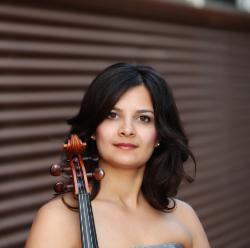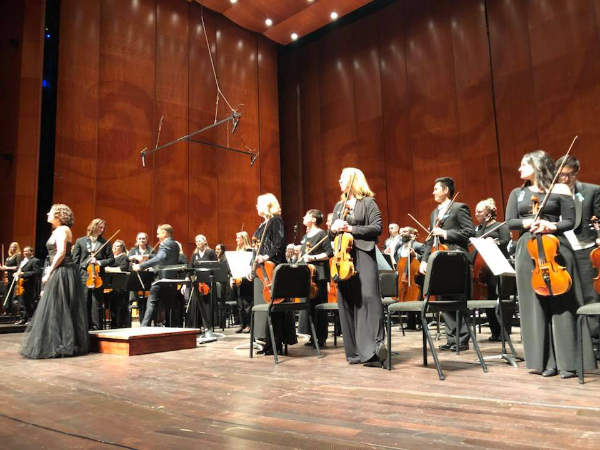
Photo credit: Stacy Nyikos
The last year has been tumultuous for the Musicians of the San Antonio Symphony. Our collective emotions have ranged from cautious optimism to total despair as the events of the last year have unfolded.
Last spring, the Musicians of the San Antonio Symphony were notified of a plan for a takeover of the Symphony by three of the largest foundations in San Antonio, the Tobin Endowment, the Kronkosky Foundation, and HEB. These foundations joined together to form a new non-profit called Symphonic Music for San Antonio (SMSA); and under the plan, the old non-profit, Symphony Society of San Antonio (SSSA), which had run the SAS since its founding in 1939, would transfer all its assets to SMSA and cease to exist. Publicly, SMSA vowed to pay the musicians what they deserved, all while returning financial stability to the San Antonio Symphony. It sounded like a dream come true. However, numerous SSSA board members were not in favor of the takeover plan and resigned in protest. Dr. Alice Viroslav was then named board chair of the old board (SSSA) to help with the transition to the new board (SMSA). At the time, Dr. Viroslav also was a board member of the Tobin Center for the Performing Arts, an independently-run non-profit that operates the concert hall that houses the San Antonio Symphony.
Preceding the takeover, the Tobin Center and SSSA entered into a “shared services” agreement to market the Symphony. The shared services initiative came from the CEO of the Tobin Center, Mike Fresher, formerly of the Horace Bushnell Memorial Hall Corporation (The Bushnell) in Hartford, Connecticut. Mr. Fresher previously participated in a similar plan with the Hartford Symphony, which ended up having serious adverse consequences for the musicians there. The premise was that the Tobin Center would provide the marketing services for the San Antonio Symphony, at a discounted rate to help reduce expenses.
In August, SMSA instated its own CEO, Tom Stephenson, who was the former editor of the San Antonio Express News and, like Dr. Viroslav, also a member of the Tobin Center Board. The musicians’ CBA was set to expire on August 31, and negotiations for a successor CBA had begun in June. As bargaining continued, both Dr. Viroslav, representing the old entity (SSSA), and Stephenson, representing the new entity (SMSA), sat at the negotiating table claiming the authority to bargain. Both entities were represented by the same lawyer, which in our view was a serious conflict of interest.
With the CBA expiration looming, the negotiations committee was spending an inordinate amount of time answering questions about the terms of the existing agreement, and both sides felt that the best course was to agree to a four-month contract extension. Stephenson’s first move as CEO was to cut costs and “trim any extra fat” from the symphony’s already lean budget. He immediately expanded the shared services agreement with the Tobin Center, so it would now house the administrative offices and manage payroll, marketing, and human resources, as well as the overall finances. Musicians then saw a drop in attendance for concerts and a lack of marketing materials; our season subscriptions were down 30 percent.
Throughout the fall, contract negotiations were on hold at Stephenson’s request. In early December, he brought up at the negotiation table the claim that the orchestra’s participation in the AFM-EPF represented a large liability. Our committee and the union stressed that there would be no issue or penalty for withdrawal if we stayed in the AFM-EPF. Stephenson repeatedly stressed the risky condition of the fund, and stated the only reason the transfer of assets from the SSSA to SMSA had not happened yet was because of the potential pension liability.
In mid-December, less than two weeks before the CBA extension was set to expire, the negotiating committee had another meeting with SMSA and Stephenson, accompanied by Dr. Viroslav and their shared lawyer. Shockingly, there was no offer from SMSA and the meeting lasted less than ten minutes total. Because SSSA had not yet transferred assets to SMSA, Stephenson questioned the ability of SMSA to even be at the negotiating table. Considering the fact that SMSA had been negotiating with the musicians since June, the negotiations committee found this statement to be in bad faith. SMSA and Stephenson, along with Dr. Viroslav and their shared lawyer, abruptly ended the meeting. The union immediately filed an Unfair Labor Practice charge for failure to negotiate in good faith against SSSA and SMSA as joint employers.
The Musicians of the San Antonio Symphony needed to let the public know what was happening. We held a press conference on December 21, in front of the offices of the Tobin Center, and called for Stephenson to “stop playing games and commit to bargaining with the Musicians Society of San Antonio.”
After the press conference, the musicians played their last show of 2017 on December 23, uncertain of the future of the organization. The holiday season was filled with tension, anxiety, and confusion.
On December 27, SMSA and Bruce Bugg, head of the Tobin Endowment and current board member and former chair of the Tobin Center, issued a press statement announcing they were terminating the takeover process that they had initiated in early spring. Essentially, they pulled the plug on the Symphony after months of gutting the staff, consolidating shared services, failing to negotiate a new contract, and disassembling the previous non-profit infrastructure and board.
On January 3, the remaining board members of SSSA called an emergency board meeting. This group, stripped of many of its recent members, would determine the future of the San Antonio Symphony. Musicians showed up to work that same day to begin rehearsals for the upcoming program, a celebration of the city’s tri-centennial. The concerts were slated for January 5 and 6 as an opening weekend celebration; instead, the collective sentiment was extreme sorrow and uncertainty from both musicians and concertgoers. We sat in our seats and rehearsed, the only thing that could be done.
Our three musician board representatives attended the SSSA’s board meeting on January 3 to discuss the remainder of the 2017-2018 season. In executive session, Dr. Viroslav and the board made the decision that with such a short amount of time to reconstitute the board and management and to raise funds, they were left with no other choice than to cancel the remainder of the season. An emergency orchestra meeting was called on January 4 and the tenuous future of the Symphony was discussed. Musicians learned that ticket revenue was being refunded to the purchasers, which was shocking; we thought that there was still a sliver of hope of salvaging the season. Halfway through the orchestra meeting Dr. Viroslav placed a call to Craig Sorgi, negotiations committee chair, and said she had resigned.
Things moved quickly in the days that followed, with musicians preparing to play their final concert of the season. Post-concert receptions were cancelled and Ticketmaster refunded ticket sales for all of the movie concerts. The Tobin Center for the Performing Arts had not yet refunded the tickets for our classical and pops shows. In addition, SSSA scheduled an emergency board meeting to determine a new board chair.
Kathleen Weir Vale was elected board chair of SSSA on January 5. Her election, the return of control of SSSA, and the orchestra’s plight generated massive community support as we prepared for our last concerts of the season. The weekend’s concerts were packed, with musicians receiving standing ovations both evenings.
At the beginning of the concert on Friday, January 5, however, that was not yet apparent, and the hall was filled with a wide array of emotions—sorrow at the orchestra’s apparently imminent demise, regret at being deceived about SMSA’s agenda, and gratitude for one last opportunity to be, and to hear, the San Antonio Symphony. The musicians met the public in front of the hall before the concert to garner support. But even then, the Tobin Center interfered with musicians’ peaceful efforts to engage patrons, summoning the police in an attempt to stop lawful leafleting. Shock at the Tobin Center’s crackdown against the musicians went viral on social media. At intermission, musicians again went into the lobby to greet and thank our amazing audience, students, families, and friends. The love for both the symphony and the music that evening was palpable and inspiring.
After intermission, Maestro Sebastian Lang-Lessing came on stage to announce that our new board chair, Mrs. Vale, had reinstated the season and as many concerts as possible would be continuing as planned. The audience burst into a thunderous standing ovation, with the onstage musicians in shock, relief, and complete surprise. What began as a somber farewell performance ended with a shocking twist of goodwill and celebration of classical music in the city of San Antonio.

The roller-coaster January 5 concert
Photo credit: Jennifer Garcia Hettinger
It turned out that in the 24–48 hour period after the season was cancelled on January 3, and before our concert on the fifth, many former board members had rejoined the board and significant financial gifts were made. We celebrated the miraculous return of our season and our Maestro’s birthday after the performance backstage on the fifth with a champagne toast in the good company of our new board chair.
While our season has not been restored in its entirety, we have maintained all but four weeks and added an extra week of opera. Our season, which would have been 30 weeks, is now slated for 27 weeks including the additional opera week. On January 10, just five days after our new board chair was elected, we reached a contract agreement and have raised our EMG to $30 a week (from $10) while maintaining our current base weekly salary. We have an Interim Executive Director, Karina Bharne, former Vice President and General Manager, who is well acquainted with the challenges of this organization and is preparing for forthcoming negotiations. The future of the San Antonio Symphony is still unknown, but with the renewed community support from patrons, students, elected officials and our board, we are now in a position to harness positive momentum moving forward.





